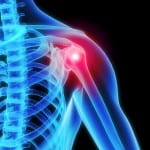The shoulder is the most flexible joint in the body which also makes it very easy to become unstable. The muscles, tendons and ligaments of the shoulder are often overused and over trained – which subject the shoulder to years of stress and micro trauma.
How does shoulder pain develop?

Other causes of pain in the shoulder include tendonitis, bursitis, injury causing dislocation, impingement syndrome, rotator cuff tear, adhesive capsulated (frozen shoulder), poor posture or fracture. Degenerative conditions and other diseases in the body may also contribute to shoulder problems or generate pain that travels along the nerves to the shoulder.
What are the symptoms of shoulder pain?
Individuals experiencing pain because of an injured rotator cup often experience a dull aching pain, which is worsens with activity. Lifting the arm overhead commonly produces pain (for example, putting the dishes in the cupboards). Symptoms of shoulder tendonitis include a slow onset of discomfort, pain in the upper third of the arm and difficulty sleeping on the afflicted side. Bursitis often causes redness and swelling that is warm and tender to touch.
Individuals with minor shoulder pain, clicking, giving way or frozen shoulder usually are experiencing the earliest symptoms of arthritis. Osteoarthritis can begin in those as young as thirty, and may progress for many years before symptoms appear.
What are the common treatments of back pain?
Conventional medical treatments help relieve the symptoms of shoulder pain but they do not address the root cause of the problem. Traditional treatments include the use of over the counter medications, prescription medications, steroid injections and physical therapy.
Physical therapy or the strengthening of the functional weaknesses in the shoulder, can help to alleviate chronic shoulder pain. However, true correction can only occur when both the structure (spine alignment) and function (muscular weakness and imbalances) have been restored.
Think Corrective Chiropractic may be for you? Call us!
To experience Family Health Chiropractic for yourself or your family, schedule a consultation, email us or call 512-347-8881.
Family Health Chiropractic is a full time natural medicine doctor’s office. We have successfully treated all of the conditions we write about. The difference is in the care, technique, and experience you get with Dr. Daniel and his team at Family Health Chiropractic.
